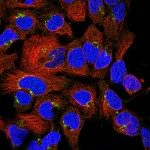Lien vers Pubmed [PMID] – 18036195
J. Neurochem. 2008 Apr;105(1):239-50
Prion diseases are transmissible fatal neurodegenerative diseases of humans and animals, characterised by the presence of an abnormal isoform (scrapie prion protein; PrP(Sc)) of the endogenous cellular prion protein (PrP(C)). The pathological mechanisms at the basis of prion diseases remain elusive, although the accumulation of PrP(Sc) has been linked to neurodegeneration. Different genomic approaches have been applied to carry out large-scale expression analysis in prion-infected brains and cell lines, in order to define factors potentially involved in pathogenesis. However, the general lack of overlap between the genes found in these studies prompted us to carry an analysis of gene expression using an alternative approach. Specifically, in order to avoid the complexities of shifting gene expression in a heterogeneous cell population, we used a single clone of GT1 cells that was de novo infected with mouse prion-infected brain homogenate and then treated with quinacrine to clear PrP(Sc). By comparing the gene expression profiles of about 15 000 genes in quinacrine-cured and not cured prion-infected GT1 cells, we investigated the influence of the presence or the absence of PrP(Sc). By real-time PCR, we confirmed that the gene encoding for laminin was down-regulated as a consequence of the elimination of PrP(Sc) by the quinacrine treatment. Thus, we speculate that this protein could be a specific candidate for further analysis of its role in prion infection and pathogenesis.

